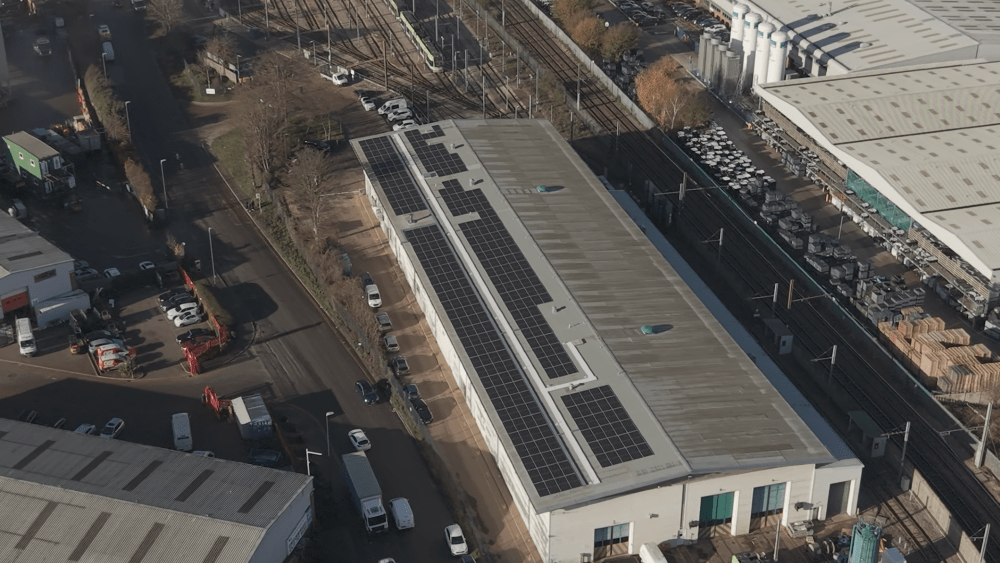Chancellor of the Exchequer Rachel Reeves has announced funding plans for the transport and energy sectors, following the UK Government’s year-long review of Whitehall finances.
Transport and energy were described in its Spending Review document as “critical to the delivery of the (UK Government’s) growth mission”.
Key highlights include a £2.6bn commitment over phase two of the government clean energy plans to decarbonise transport. There was also a £2.4bn investment for motorways and A-roads.
The new funding includes £1.4bn to support continued uptake of electric vehicles, including vans and heavy goods vehicles (HGVs) – and £400m for the further rollout of charging infrastructure.
It will also be extending the Advanced Fuels Fund to 2029-30 to support the production of sustainable aviation fuel, and there is £616m to build and maintain walking and cycling infrastructure.
The government’s £2.3bn in the Local Transport Grant over Phase 2 for local transport improvements including bus lanes, cycleways and congestion improvement measures in places outside of those areas receiving TCR settlements. This will deliver a fourfold increase in funding in 2029-30 compared to 2024-25, it said.
In the energy sector, as pre-announced earlier in the week, there is due to be a multi-billion pound investment into nuclear power, including Sizewell C power station in Suffolk.
Some £330m in contracts have been signed with local companies and will boost supply chains across the UK with 70% of contracts predicted to go to 3,500 British suppliers. The equivalent of around six million of today’s homes will be powered with clean homegrown energy from Sizewell C.
HM Treasury has said that up to £27.8 billion capital wiil be invested through the National Wealth Fund (NWF), and it will prioritise investment into the clean energy, digital and technologies, advanced manufacturing, and transport sectors. The NWF will consider investments in dual‑use technologies and investments to support supply chain resilience across its priority sectors, it said.
In addition, last week the UK Government said it would be injecting £15.6bn into the North, Midlands and the South West for buses, trams and local train infrastructure in city regions.
Investment will be used on schemes such as the Metro extension linking Washington to Newcastle and Sunderland, and the renewal South Yorkshire’s tram network linking employment and housing areas in Sheffield and Rotheram.
There is also £22.6 billion per year for research and development by 2029‑30, in support of the government’s forthcoming modern Industrial Strategy.
Chancellor of the Exchequer Rachel Reeves said:
“This Government is renewing Britain. But I know too many people in too many parts of the country are yet to feel it. This Government’s task – my task – and the purpose of this Spending Review – is to change that. To ensure that renewal is felt in people’s everyday lives, their jobs, their communities.
“So that people can see a doctor when when they need one. Know that they are secure at work. And feel safe on their local high street.
“The priorities in this Spending Review are the priorities of working people. To invest in our country’s security, health and economy so working people all over our country are better off. That is what this Spending Review will deliver.”
“These are my choices. These are this Government’s choices. These are the British people’s choices. I have made my choices. In place of chaos, I choose stability. In place of decline, I choose investment. In place of retreat, I choose national renewal.”
Responding to the review, Vicky Edmonds, Chief Executive of EVA England, said
“We welcome the continued Government spending commitment towards the EV sector. However, what matters now is how this funding will be spent. We urgently need clarity to ensure drivers remain at the heart of this investment, via targeted incentives that render EVs more affordable and accessible, alongside a continued rollout of public charging infrastructure.
“Too many cost barriers remain such as the Expensive Car Supplement that disproportionately impacts EVs and actively dissuades some drivers from considering electric. VAT on public charging, meanwhile, alongside more planning and regulatory barriers continue to promote a ‘two tier’ system between EV drivers with and without access to reliable and cost-effective home charging.”
Vicky Read, CEO of ChargeUK, said:
“The decarbonisation of transport is only possible if government and the private sector work effectively together. ChargeUK members’ commitment to invest £6 billion through to 2030 has already delivered over 80,000 public charge points, with a new one deployed every 25 minutes on average.
“We therefore strongly welcome the Chancellor’s announcement today of investment to support this transition, with £1.4 billion allocated for vehicles and £400 million for charging infrastructure.”
BVRLA Chief Executive, Toby Poston, said:
“The Government is clearly committed to its road transport decarbonisation targets and giving serious thought to how it achieves them. The mandate flexibilities announced in April relieved the pressure on EV supply, today’s cash commitment could give a much-needed boost to demand.
“This £1.4bn could make a big difference in driving stronger and wider demand for vans, trucks and used electric vehicles. We will continue to work with colleagues at OZEV to highlight how this money can achieve the best return on investment.”
Mike Hawes, SMMT Chief Executive, said:
“The automotive industry recognises the pressure on the public purse and the need to divert funding to defence and growth. Automotive can deliver that growth but it depends on both competitive conditions and consumer confidence. Some support for EVs has been made available, but more substantive measures to incentivise private consumer demand are still needed if world leading targets are to be met.
“Government has already made great efforts to support a critical industry facing significant geopolitical challenges but without market-making interventions, that world-leading pace of transition may need to be reviewed.”
Sue Robinson, Chief Executive of the National Franchised Dealers Association (NFDA), said:
“The Government’s Spending Review sets a crucial tone for the coming years and while it is welcome to see investment directed toward infrastructure, skills and EVs, Chancellor Rachel Reeves MP’s review, similar to the Spring Statement, has left some issues in the dark.
“The £15.6 billion transport package and renewed focus on regional connectivity are positive signals for dealer networks and supply chains across the North and Midlands. Efficient transport infrastructure supports business mobility/customer access and ultimately boosts confidence across local economies where many of our members operate.”
Jack Cousens, head of roads policy for The AA, said:
“Today’s spending review offers a pathway to improved mobility by road, including £2.4 billion for the improvement of motorways and A roads. That offers some hope to those drivers stuck daily in traffic jams on the M25 and motorways around Manchester.
“Investment in EV charging will spur more businesses and travellers who rely on their cars to convert to electric vehicles. However, more needs to be done to help people switch such as equalising VAT on out-of-home charging and discounting VED rates. We hope the Chancellor makes these changes as soon as possible.
“The boost to policing is also very welcome, particularly if it means more cops in cars. One of the biggest deterrents to some of the rampant bad behaviour on roads is the perception that being caught by the police is a very real prospect. Similarly, a key way to reduce insurance premiums to is to cut vehicle theft – something more traffic officers could achieve.”
Mike Nakrani, CEO of VEV, said:
“The projects outlined are a critical step forward in the delivery of more efficient, cleaner, smarter and accessible mass transportation in regions that will benefit hugely from these developments.
“What’s critical is to ensure that these investments are geared towards new technologies and innovations that make the most of an increasingly renewable grid. Whether we’re moving people, goods or waste, electrified transport networks are a no regrets answer to unlocking a cleaner, more comfortable transportation system for all.”
Chris Scudamore, leader for capital projects and infrastructure at PwC UK, said:
“The Chancellor’s announcements today, of an extensive package of infrastructure spending, underlines this Government’s commitment to improving the nation’s infrastructure as a key enabler of economic growth. Infrastructure related commitments across energy, defence, housing, transport, education, health and digital are welcomed and reinforce the critical role infrastructure plays in enabling a modern economy to grow and thrive.”
“All eyes will now be on delivery with the 10 Year Infrastructure Strategy to follow next week. As a nation we have a proud history of delivering major infrastructure projects, but recent challenges have shown there is a real need to enhance the efficiency and effectiveness of delivery.”
Alison Edwards, Director of Policy and External Relations at CPT, said:
“Transport is fundamental in kickstarting economic growth. Buses, in particular, enable 11 million people every day to get to work, to access education and to spend money in local high streets.
“While most passengers already pay less than the £3 cap, we recognise that low headline fares are an important part of the mix to enhance buses’ appeal, so the industry will again work closely with government to make the latest extension to the fare cap work.”
Thomas Knight, transport market lead for UK and Europe at Mott MacDonald, said:
“Government’s renewed and increased commitment to transport infrastructure investment will deliver transformational projects like East West Rail, the Midlands Rail Hub and the TransPennine Route Upgrade.
“These schemes, alongside the four-year funding settlement with Transport for London, will not only strengthen the UK’s long-term economic resilience, but also help unlock the full potential of towns and cities across the country. Confirmation that Northern Powerhouse Rail will feature in the 10-Year Infrastructure Strategy is also encouraging.”
Richard Earl, Head of R&D, EO Charging, said:
“It’s great to see the government’s planned investment in both technology R&D and the energy sector today.
“What we need to understand is, how will this investment be distributed? How much will be assigned to the electrification of transport, and how much will be assigned to the upgrade of the national grid and other electrical infrastructure?”
Frank Gordon, Director of Policy & Head of Power at the REA, said:
“The Government is clear that we must move homeowners away from a reliance on fossil fuels if we are to drive down domestic emissions, but this plan overlooks a number of low-carbon heating technologies that would give consumers more options for decarbonising their homes. We’re urging the Government to go further with the Warm Homes Plan, and recognise that bioenergy heating solutions must play a role if we are going to meet our ambitious net zero goals, and help consumers everywhere make more sustainable choices.”
Quentin Willson, Founder of FairCharge, said:
“The government’s continued commitment to EV adoption and charging is indeed welcome, but beyond the headline pledges we need to see reform of the Treasury’s out of step EV taxation policies. VAT on public charging needs to be lowered and the Expensive Car Supplement on EV VED should be scrapped. Ministers promise support for EVs, while Treasury creates barriers to adoption. The disconnect is concerning.”
Image from Shutterstock












